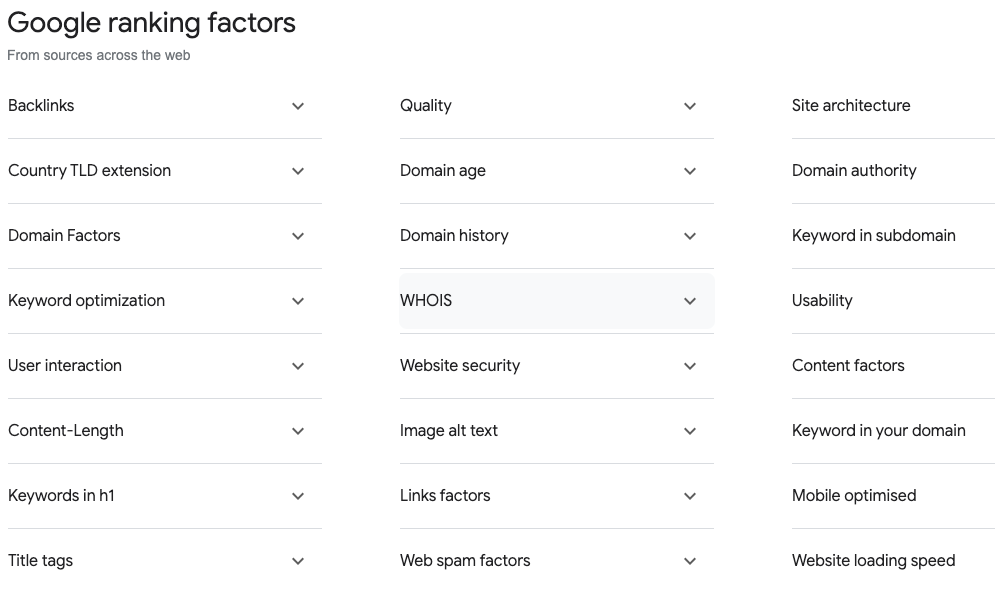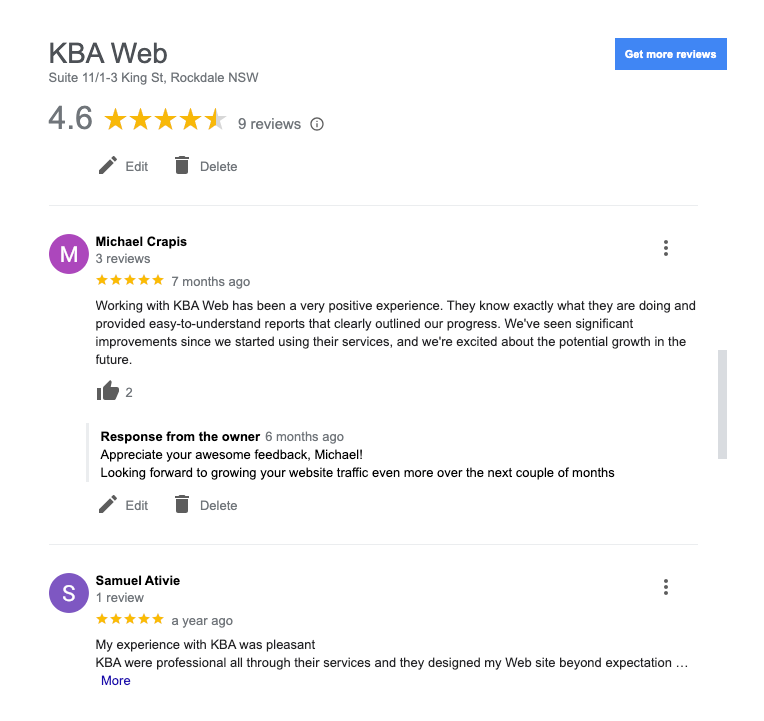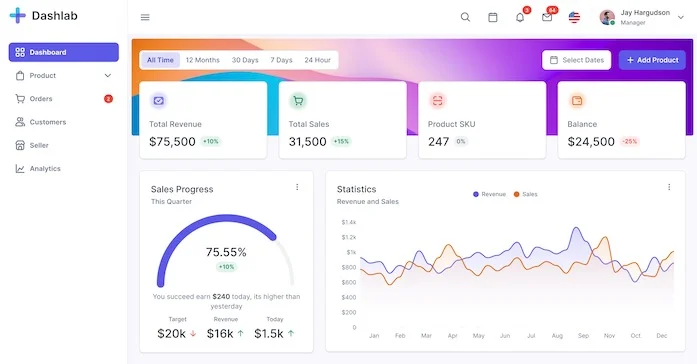Want your business to show up first when people search for services in your area? Local SEO is the answer. It’s how search engines like Google decide which businesses match local searches best.
In this guide, we’ll break down the top factors that impact your local SEO ranking, so you can attract more customers and grow your business.
Key Takeaways
- Accuracy is Key: Make sure your business information (NAP) is consistent across your website and online listings.
- Quality Over Quantity: Focus on getting reviews and backlinks from reputable sources.
- Be Relevant: Create content that speaks directly to your local audience.
Table of Contents
What is Local SEO?
Local SEO, short for Local Search Engine Optimisation, is a strategy to boost a business’s visibility in online searches, particularly when users seek products or services in a specific geographical area.
Imagine you run a warm coffee shop in Sydney. When a person searches for “best coffee shops in Sydney” on Google, you want your café to be right there on that list.
Local SEO ensures your business stands out when nearby customers search for the products or services you offer. It’s about being at the right place online, just when someone needs you.
How Local SEO can help your local business
Local SEO is crucial for brick-and-mortar businesses, like local stores, restaurants, or service providers.
Why? Well, according to the latest SEO statistics 30% of searches made on mobile are for finding businesses. Local SEO strategies guide these online users to visit or get in touch with their actual store or shop.
Put differently, Local SEO connects businesses with local customers who are actively seeking what they offer.
What are ranking factors?
Ever wondered how Google decides who goes first when you search for something? That’s where ranking factors come in.
Ranking factors are a set of rules or criteria that search engines like Google use to decide which websites deserve to be on top of search results.
These search engines constantly check websites to see how well they’re following the rules.
The better you play by these rules, the better chances you have of getting a higher spot in search results.

Ranking factors are not set in stone…
One thing you have to keep in mind is that ranking factors constantly change…
Algorithms get updated often. New factors can become more important, and some that are crucial for rankings now might not be as significant later on.
And this is why SEO consultants are often on their toes. They keep watch on any search engine updates, read industry publications and SEO insights, and adjust their SEO strategies accordingly.
Why exactly do search engines like Google keep updating their algorithms? There are a number of reasons:
- Constantly Evolving Internet
The digital landscape is ever-changing, with new websites emerging and existing ones evolving. Google must continuously adjust its algorithm to keep pace with these developments.
- Improving Search Quality
Google strives to enhance search result quality, ensuring users find the most relevant and informative results. To achieve this, constant updates are made to consider new factors influencing search result quality.
- Combatting Spam and Black Hat SEO
Spammers are relentless in finding ways to manipulate Google’s algorithm for higher rankings. Google responds by frequently updating its algorithm, making it tougher for spammers to succeed and maintaining a fair and reliable search environment.
For example, keyword density used to be one of the most important ranking factors. Websites would often try to stuff their content with keywords to rank higher.
But this made the quality of the content worse. Fortunately, search engines now penalise websites that resort to this unethical tactic.
Topical authority is another ranking factor that has always been important and is now even more crucial. With so much info on the web, Google thinks websites that give thorough, well-researched, and trustworthy information should rank higher.
What are the ranking factors of local SEO? Top 8 that matters
Local ranking criteria are specific elements that search engines use to determine the order in which local companies appear in search results, especially for “near me” queries. These factors can be broadly classified into the following categories and these are the top local seo techniques:
1. Google My Business (GMB)
Google My Business (GMB), also referred to as Google Business Profile (GBP) is a tool that serves as your online listing on Google Search and Maps.
Here, you can showcase essential information about your business when people search for your type of product or service, such as:
- Business name, address, and phone number (NAP)
- Opening hours
- Website link
- Business photos
- Customer review
GMB is a crucial ranking factor as it helps Google determine how relevant your business is to the location-based search query that a user is entering.
It looks into details such as your proximity to the searcher, your trustworthiness (through ratings), and the nature of your business, among many others.
With a well-optimised GMB profile, you’ll pop up more often when people in your area are searching for something related to your business. You can either appear high in organic results or rank for the Google Map Pack
And that’s important considering 42% of those looking for local information tend to click on a result in the Google Map Pack.
Takeaways and Tips:
- Verify and claim your GMB listing.
- Provide accurate business information – name, address, phone number, website, and operating hours.
- Showcase appealing images and videos of your business.
- Encourage and respond to customer reviews.
- Keep your business information fresh and accurate, especially if there are any changes in your business details.
2. On-Page signals
On-page signals are the elements on your website that help search engines like Google see and understand what your business is about.
The more that search engines understand what your website is, the more they see how relevant you are to a search query. This boosts your appearance in local searches.
So, what specific on-page elements does Google look into?
- Local keywords
Local keywords are the words or phrases that include the specific location you’re targeting, like a city or a region.
For instance, if you run a pizza place in Melbourne, using keywords like “best pizza in Melbourne” helps Google understand your local relevance.
These keywords should be present throughout the page, including in parts like the title tag, meta description, headings, and body text.
- NAP details
As mentioned, NAP stands for Name, Address, and Phone number.
When this information is consistent across your website and other online directories, it helps Google to verify the existence and legitimacy of your business, and to assess its popularity and authority.
- Mobile-responsiveness
When your website functions smoothly on mobile devices, you provide a good user experience – something Google values highly…
So, you are more likely to rank higher in local search results.
Think about fast page loading speed, a fluid site layout, and easy navigation bars and buttons.
- Internal linking
Internal linking involves linking relevant pages within your website, which improves relationships between pages and your overall site structure.
When you link relevant pages to each other, you’re guiding both visitors and search engines to important content.
This makes your website more navigable, enhancing the overall user experience and SEO performance.
Takeaways and Tips:
- Use relevant keywords throughout your pages, especially in the title tag, meta description, headings, and body text.
- Write clear and concise title tags and meta descriptions that accurately describe the content of your pages
- Use the same NAP information on all of your website’s pages. Show it prominently on your homepage and include it in page footers.
- When building your site, apply a mobile-first approach to ensure it functions flawlessly on various devices.
- Use internal links to connect related pages on your website.
3. Online listings/Citations
Online listings, also known as citations, are mentions of your business across various online platforms.
For example, when we consider the Dental SEO keyword, “best dental services in Perth”, the top three organic results show these business platforms or directories:
Just like in GMB, these mentions typically include your business name, address, phone number, and sometimes additional details like your website.
Think of it like being listed in the modern-day Yellow Pages.
Search engines use these citations for the same purpose that local searchers use them – to find valuable information about your business and confirm if it’s real and credible.
So, it’s crucial that your NAP and other essential details are accurate and consistent across these directories.
This uniformity ensures that search engines trust the information about your business. As a result, you strengthen your online identity and boost your SEO local ranking.
Takeaways and Tips:
- Get listed in online directories relevant to your business. Apart from GMB, other popular platforms include Yelp, Bing Places, and Yellow Pages.
- Regularly check your online citations for accuracy, and be ready to update them if anything changes.
- Make sure your NAP information is consistent across all online listings.
4. Backlinks
Backlinks are links from other websites that refer back to your site. They act as “endorsements” that signal trust and credibility to search engines.
When reputable websites link to yours, it affirms your local presence, relevance, and authority
It tells Google and other search engines that your website is a valuable resource and that it should be ranked higher in search results.
In the past, having lots of backlinks was seen as a surefire way to boost your website’s reputation. However, now, backlinking is not just about quantity…
Quality holds equal weight. It’s not about collecting any links you can find anymore but rather about gathering links from reputable sources…
And this requires a bit of networking. Show how you can be of value to other local businesses. Get involved in local organisations. Build genuine, mutually beneficial relationships, and those backlinks will come naturally.
Takeaways and Tips:
- The quality of your backlinks matters. Aim for links from trusted sites rather than gathering lots of low-quality ones.
- Create high-quality content. By doing this, you’re offering something valuable that other websites will appreciate and likely link to.
- Participate in guest blogging. Share unique, informative, and engaging content, and the website will link back to you in return
- Get listed in relevant online directories as this helps to create backlinks from other websites.
- Sponsor local events and include your website address on promotional materials.
5. Customer reviews
Customer reviews are real-life testimonials from customers about their experiences with your business, shared online.
They can be posted on your own website, on online review platforms such as Google Business Profile and Yelp, or on social media.
Good reviews signal happy and satisfied customers. And since Google and search engines put users first, they rank businesses with good reviews higher in local search results.
More specifically, search engines look at these ranking signals:
- Sentiment: Businesses with more positive reviews are more likely to rank higher than businesses with more negative reviews.
- Quantity: A higher quantity of customer reviews can imply that a business is more popular and well-liked by its customers. It can also suggest that the business has been around for longer.
- Quality: High-quality reviews are more informative and detailed, and they are more likely to be trusted by potential customers.
- Recency: Newer reviews are more likely to be relevant to current customers’ experiences.
- Relevance: Reviews that are specific to the business’s industry and location are more likely to be helpful to potential customers.
What’s more, reviews are opportunities for you to engage with your customers and build relationships…
It shows potential customers that you value feedback and are committed to providing a good customer experience…
Search engines see this as a signal that your business is active and involved.
Takeaways and Tips:
- Provide EXCELLENT customer service. A positive experience encourages customers to leave a review.
- Get listed in popular online directories and review platforms. Make sure that they are relevant to your business.
- Respond to reviews, both positive and negative.
- Make it easy for customers to leave reviews. This can be done by providing links to your review profiles, offering incentives for leaving reviews, and so on.

6. Localised content
Localised content involves creating content that is tailored to the specific needs and interests of a local audience.
This includes talking about local events, using local keywords, and discussing the latest trends or topics important to your local customers.
To put it simply, imagine talking to your next-door neighbour – you use familiar words and shared experiences.
Creating personalised and localised content makes it easier for your audience to connect and relate with you, sparking positive interactions.
This tells Google and search engines that your website is valuable for local customers, resulting in a higher search result ranking.
Takeaways and Tips:
- Think local. Include local keywords in your content, feature local success stories, and use images or videos that reflect your community.
- Get listed in popular online directories and review platforms. Make sure that they are relevant to your business.
- Encourage customers to leave reviews, and respond accordingly to any feedback they have.
7. Behavioural signals
Behavioral signals are the user interactions with your website or business listing.
These signals primarily pertain to the following:
- Click-through rates (CTR): the percentage of users who click on your website or business listing in the search results.
- Dwell time: the amount of time that users spend on your website
- Bounce rates: the percentage of users who leave a website after viewing only one page
- Social media engagement: the number of likes, shares, and comments that a business receives on its social media posts
These signals matter in local SEO because they reflect your visitors’ engagement level and satisfaction.
When visitors stay longer and engage more, search engines see this as a sign that your website is helpful and meaningful to users. This can lead to higher local SEO rankings.
If you attend to the ranking aspects we discussed earlier, like personalised content, good reviews, well-maintained GMB and business listings, you’ll naturally address these behavioural signals too.
If you attend to the ranking aspects we discussed earlier, like personalised content, good reviews, well-maintained GMB and business listings, you’ll naturally address these behavioural signals too.

8. Proximity to searcher
Proximity to searcher simply means how close your business is to the local searcher’s location. This is important because users usually look for businesses closest to them.
Google takes into account the user’s location when ranking local businesses. If your business is not close to the user who is searching for it, Google is less likely to rank your business high in the search results…
Put differently, when someone looks for a nearby coffee shop, Google wants to show them the ones just a short stroll away, not on the other side of town.
Of course, you can’t change your office or shop’s location. But, you can ensure you’re the top choice for customers nearby who are seeking your services or products.
Takeaways and Tips:
- Make sure NAP details are consistent, from your GMB to the other online directories you are in.
- Ensure that your website is mobile-friendly and loads flawlessly regardless of the device your customers are using.
- If you offer services in different specific locations, make sure to create location-specific landing pages on your website.
This helps Google understand exactly where you are and who you can serve.
For example “SEO services Sydney” and “ SEO company Melbourne”.
What factors influence local pack ranking in Google Maps?
he Google Maps local pack ranking is primarily influenced by three key factors:
- Relevance: This refers to how closely your business matches the user’s search query. It considers your business category, products or services offered, and the keywords used in your Google Business Profile.
- Distance: This refers to the proximity of your business to the user’s location or the location specified in their search. Businesses closer to the user are more likely to rank higher.
- Prominence: This refers to the overall popularity and reputation of your business. It takes into account factors like the number and quality of online reviews, backlinks to your website, and social media engagement.
In addition to these core factors, other elements that can impact local pack ranking include:
- Complete and accurate Google Business Profile: A well-maintained profile with up-to-date information like business hours, address, phone number, and photos can significantly boost your visibility.
- Positive online reviews: A high number of positive reviews and ratings on Google and other platforms can enhance your reputation and trustworthiness.
- On-page SEO optimization: Optimizing your website with relevant keywords and location-specific content can improve your chances of ranking in local searches.
- Citations and backlinks: Having your business listed in reputable online directories and earning backlinks from high-quality websites can further strengthen your local SEO.
By focusing on these factors and optimizing your online presence, you can improve your chances of appearing in the Google Maps local pack and attracting more potential customers to your business.
Level up your Local SEO game with ease
Now that you have a grasp of the essential local SEO ranking factors, it’s time to put the strategies into action.
Incorporating local keywords, creating content localised content, and ensuring your online listings have precise information are just some of the vital steps you’ll need to take.
If managing all these tasks feels a bit too much, you can always hand it over to the experts.
Concentrate more on your business, and let the professionals take care of the SEO details. Get in touch with a reliable local SEO agency today!






